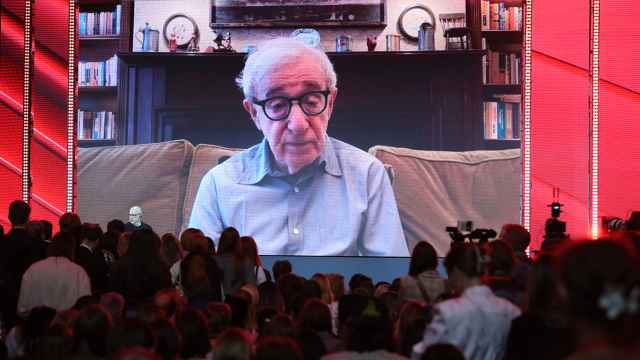We got to talking and I was surprised and pleased to hear Olga say she has added a new line to her resumé: Not long ago she was asked by the editor of Passport magazine to begin contributing theater reviews. This is noteworthy for at least two reasons: 1) A print publication in our day and age of economic anemia actually hiring a critic rather than firing one; and 2) the role reversal: Imagine what it must be like for someone used to bearing the brunt of the critic's sting to have to go out and crack the whip herself.
So, after complimenting Olga on her fiery attire, I asked her to explain what it is like for her to sit in judgment of her friends and colleagues. For those who don't speak Russian, here is an approximate rendering of Olga's thoughts in English:
"It's unnatural for a playwright to be a critic because you have to look at everything with a critical eye. As a playwright, however, you are used to seeing things in an ideal light. And then there's this: you want to root for your fellow playwrights. It's not right for a playwright to criticize another playwright. You can criticize theater, that's okay. But it's wrong to criticize your colleagues who don't have it easy as it is.
"New plays aren't staged often these days. It is no longer like it was in the past when almost all new plays had a chance to be staged and then to live or die on their merits. That process was interrupted 25 or 30 years ago. The situation today is unnatural. When you watch a production of a new play today you wonder: It this a case of the theater ruining a playwright's work, or is it a case of the writer knuckling under to the demands of the theater?
"So you feel bad for the poor writer &mdash he's like a dog on a chain who is badly fed.
"And that is why I believe that playwrights should become critics."
A Message from The Moscow Times:
Dear readers,
We are facing unprecedented challenges. Russia's Prosecutor General's Office has designated The Moscow Times as an "undesirable" organization, criminalizing our work and putting our staff at risk of prosecution. This follows our earlier unjust labeling as a "foreign agent."
These actions are direct attempts to silence independent journalism in Russia. The authorities claim our work "discredits the decisions of the Russian leadership." We see things differently: we strive to provide accurate, unbiased reporting on Russia.
We, the journalists of The Moscow Times, refuse to be silenced. But to continue our work, we need your help.
Your support, no matter how small, makes a world of difference. If you can, please support us monthly starting from just $2. It's quick to set up, and every contribution makes a significant impact.
By supporting The Moscow Times, you're defending open, independent journalism in the face of repression. Thank you for standing with us.
Remind me later.






